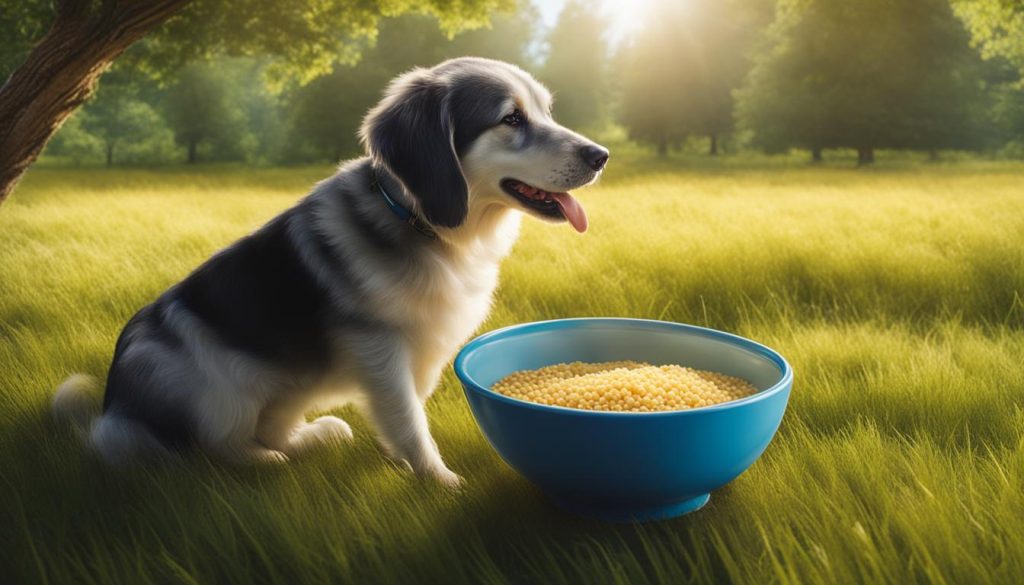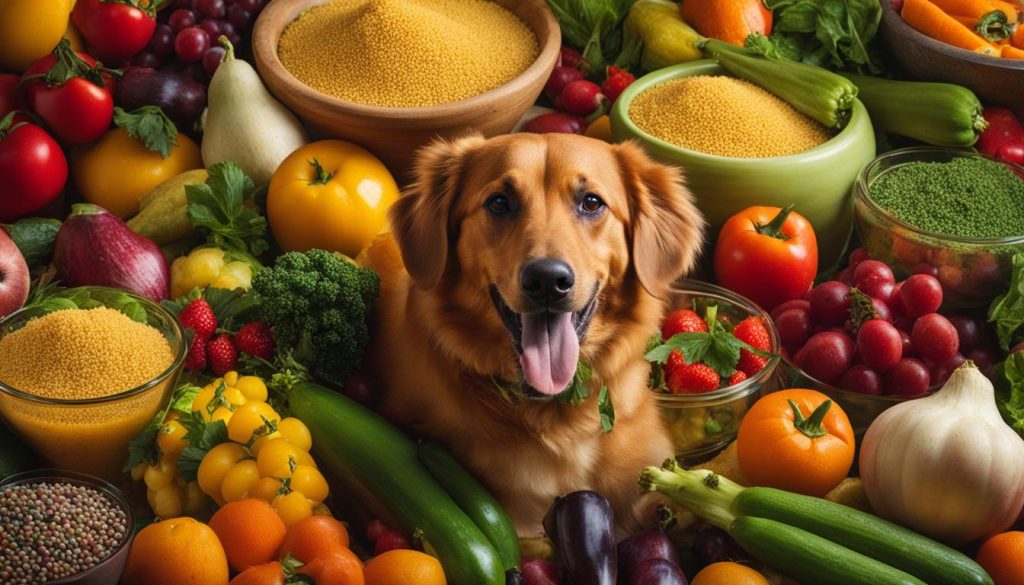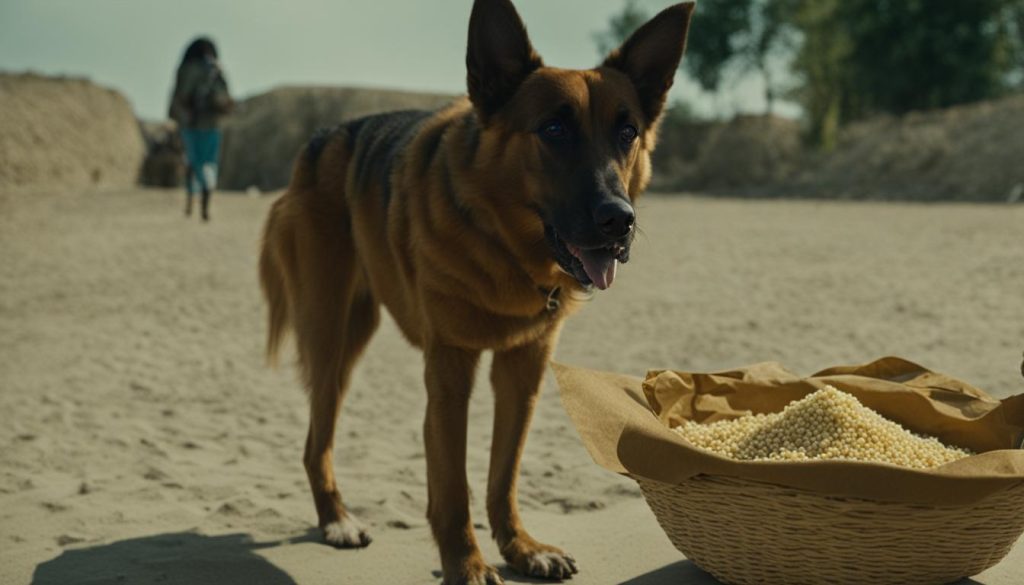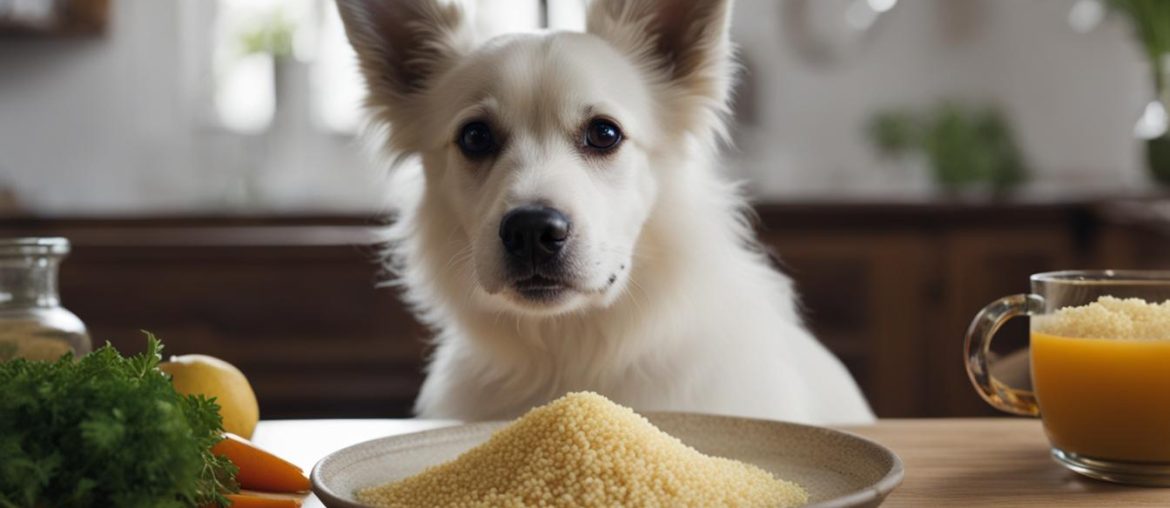As a professional journalist specializing in pet care, I often receive questions about what foods are safe for our furry friends. One popular query that frequently comes up is whether dogs can eat couscous. In this article, I will provide expert guidance and recommendations on this topic.
Key Takeaways:
- Plain couscous can be included in a dog’s diet, but only in moderation and if they do not have a gluten sensitivity or allergy.
- Couscous provides nutrients such as protein, fiber, selenium, and vitamin B6, which can be beneficial for dogs’ overall health.
- It is essential to feed dogs plain and unseasoned couscous, as ready-made options may contain harmful ingredients.
- Portion control is vital, as excessive amounts of carbohydrates like couscous can lead to weight gain and associated health issues in dogs.
- Consulting with a veterinarian before adding couscous to your dog’s diet is always recommended.
What Is Couscous?

Couscous is a type of tiny pasta made from wheat. Although it is often mistaken for a grain, couscous is technically a pasta. It is commonly used as a staple in North African and Middle Eastern cuisines, where it is enjoyed in various dishes as a primary or side ingredient.
For dogs, plain couscous can be a healthy addition to their diet. It contains protein, fiber, selenium, and vitamin B6. These nutrients offer several health benefits, such as supporting digestive health, providing energy, and contributing to overall well-being.
However, it is essential to note that not all dogs may tolerate couscous well. Some dogs may have a gluten sensitivity or allergy, as couscous is made from wheat and contains gluten. It is crucial to check with your veterinarian if your dog has any known allergies or sensitivities before introducing couscous into their diet.
| Nutrient | Amount |
|---|---|
| Protein | Varies |
| Fiber | Varies |
| Selenium | Varies |
| Vitamin B6 | Varies |
When feeding your dog couscous, it is important to ensure that you serve it plain and unseasoned. Avoid using ready-made couscous mixes that may contain harmful ingredients or spices, such as garlic or onion, which can be toxic to dogs. Additionally, couscous expands when wet, so be mindful of portion sizes to prevent overfeeding and potential digestive discomfort.
Remember, moderation is key when incorporating couscous into your dog’s diet. It should be offered as an occasional treat or part of a well-balanced meal alongside a high-quality dog food. Consulting with your veterinarian is always recommended to ensure that couscous is suitable for your dog’s specific dietary needs.
Can Dogs Eat Couscous?
Dogs can eat couscous, but it’s important to exercise caution and consider a few factors. While couscous can be a healthy addition to their diet, it should be given in moderation and served plain, without any harmful ingredients or spices. It’s worth noting that couscous contains gluten, so it may not be suitable for dogs with a gluten sensitivity or allergy. However, it’s important to remember that most food allergies in dogs are caused by meat-based proteins, not grains like couscous.
Plain couscous can provide several health benefits to dogs, including protein, fiber, selenium, and vitamin B6. These nutrients support their overall health and can be a valuable addition to their diet. However, it’s crucial to be mindful of portion sizes when feeding couscous to dogs. Couscous expands when wet, which can lead to overfeeding and potential discomfort for your furry friend. Therefore, it’s important to serve the appropriate portion size to prevent any adverse effects.
If you’re considering introducing couscous to your dog’s diet, it’s always best to consult with your veterinarian first. They can provide personalized guidance based on your dog’s specific needs and dietary requirements. Additionally, they can help you determine the appropriate amount of couscous to include in their meals and ensure that it complements their overall nutrition plan. Remember, each dog is different, and what works for one may not work for another. Your vet can help you make informed decisions for your pet’s well-being.
| Couscous and Dogs | Summary |
|---|---|
| Can dogs eat couscous? | Yes, but in moderation and served plain. |
| Is couscous safe for dogs? | It is safe for most dogs, but not suitable for those with gluten sensitivity or allergy. |
| Health benefits of couscous for dogs | Provides protein, fiber, selenium, and vitamin B6. |
| Considerations when feeding couscous to dogs | Monitor portion sizes and consult with a veterinarian. |
Health Benefits of Couscous

Couscous offers several health benefits for dogs when incorporated into their diet in moderation. Here are some of the key advantages:
- Good source of carbohydrates: Couscous is high in carbohydrates, which provides dogs with the energy they need to lead an active lifestyle.
- High in fiber: Fiber is essential for maintaining healthy digestion in dogs. Couscous contains a significant amount of fiber, promoting regular bowel movements and preventing constipation.
- Rich in protein: Protein is necessary for building and repairing tissues. While couscous is not as high in protein as meat or legumes, it still contributes to a balanced diet for dogs.
- Provides essential vitamins and minerals: Couscous contains various vitamins and minerals that support overall health, including selenium, which acts as an antioxidant and plays a role in vital bodily functions.
These nutritional benefits make couscous a nutritious addition to a dog’s diet, especially when combined with other healthy ingredients. However, it’s important to note that every dog is unique, and consulting with a veterinarian before introducing couscous or any new food is crucial to ensure it aligns with your dog’s specific dietary needs.
Risks of Feeding Couscous to Dogs

Feeding couscous to dogs can come with certain risks that pet owners should be aware of. While plain couscous can be a healthy addition to your dog’s diet, it is important to consider a few factors before introducing it. One of the primary concerns is gluten, as couscous is made from wheat and contains gluten. Dogs with gluten sensitivities or allergies should avoid couscous, as it can lead to digestive issues and discomfort.
Another risk of feeding couscous to dogs is the potential for overfeeding. Couscous expands when wet, which means it can quickly fill up your dog’s stomach and lead to bloating or even gastric torsion, a serious condition. It is crucial to carefully measure the portion sizes and avoid excessive feeding. Additionally, too much couscous in a dog’s diet can contribute to weight gain, especially if it is not balanced with other essential nutrients.
To minimize these risks, it is important to feed plain and unseasoned couscous to your dog. Avoid pre-packaged couscous mixes that may contain harmful ingredients or spices like garlic or onion. If you choose to incorporate couscous into your dog’s diet, do so in moderation and consult with your veterinarian for personalized guidance. They can help assess your dog’s specific needs and advise on the appropriate serving size and frequency.
Remember, every dog is unique, and what works for one may not work for another. Pay attention to any signs of discomfort or adverse reactions when introducing couscous or any new food to your dog. Your veterinarian can offer the best advice tailored to your dog’s individual health and dietary requirements.
Expert Tip:
“Before feeding couscous to your dog, it is crucial to consider their specific dietary needs and any existing health conditions. Always consult with your veterinarian to determine if couscous is a suitable addition to their diet and to ensure proper portion control.”
How to Feed Your Dog Couscous

Feeding your dog couscous can be a healthy addition to their diet, but it’s important to prepare it correctly and introduce it gradually. To cook couscous for your dog, start by bringing water to a boil and then adding the couscous. Follow the cooking instructions on the package, usually simmering for 10-15 minutes until the couscous is tender. Once cooked, let it cool before serving it to your dog.
When introducing couscous to your dog’s diet, start with small amounts and observe their reaction. Monitor for any signs of stomach upset or allergies. If your dog tolerates the couscous well, you can gradually increase the portion size over time.
To make couscous more enticing for your dog, you can add proteins like chicken or beef, as well as safe vegetables such as carrots, broccoli, and sweet potato. However, ensure these additions are cooked and do not include any harmful seasonings or ingredients. Always consult with your veterinarian before making any changes to your dog’s diet.
| Guidelines for Feeding Couscous to Dogs |
|---|
| Start with small amounts and gradually increase portion sizes |
| Monitor your dog for any signs of stomach upset or allergies |
| Only feed plain and unseasoned couscous |
| Avoid harmful ingredients or seasonings |
| Consult with your veterinarian before making any dietary changes |
Remember, every dog is different, and what works for one may not work for another. It’s essential to consider your dog’s specific dietary needs and consult with your veterinarian for personalized advice. By following these guidelines and monitoring your dog’s reaction, you can safely incorporate couscous into their diet as a healthy and tasty addition.
Wrapping Up
To sum up, dogs can safely eat plain couscous in moderation, as long as they do not have a gluten sensitivity or allergy. Couscous can provide some health benefits, such as protein, fiber, selenium, and vitamin B6.
However, it is important to feed couscous plain and unseasoned, as ready-made options may contain harmful ingredients. Feeding too many carbohydrates, such as couscous, regularly can lead to weight gain and associated health issues.
It is best to introduce couscous gradually and consult with a vet before adding it to your dog’s diet. If your dog enjoys the taste, you can also make homemade couscous dog treats with added proteins and safe vegetables.
Always monitor your dog’s reaction to new foods and consult with a vet for personalized advice.
FAQ
Can dogs eat couscous?
Dogs can enjoy couscous in their diet as long as it is plain and your dog doesn’t have a gluten allergy or sensitivity. It should also only be given in moderation. (Source: First source)
What is couscous?
Couscous is a type of tiny pasta made from wheat. It is a healthy alternative to rice and other grains for people. (Source: First source)
What are the health benefits of couscous for dogs?
Couscous provides protein, fiber, selenium, and vitamin B6 to a dog’s diet. It is high in carbohydrates and can provide energy. (Source: First source)
Are there any downsides to feeding dogs couscous?
Dogs with a gluten sensitivity or allergy should not be fed couscous. Feeding too much couscous regularly can lead to weight gain and negative health effects. (Source: First source)
How should I feed my dog couscous?
Feed plain and unseasoned couscous to your dog, introducing it gradually and monitoring for any signs of stomach upset. Consult with a vet before adding couscous to your dog’s diet. (Source: First source)






